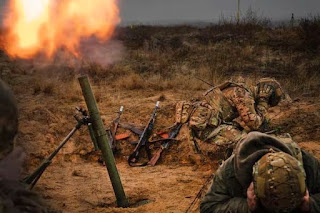The Brazen War in Ukraine
Photo source: The Irish Times
By Naveed Qazi | Editor, Globe Upfront
The war in Ukraine is far from over. As it kept on brewing in front of the world, what became apparent is that the Russian aggression was not about territorial expansion anymore, but it was actually more about controlling Ukraine’s political destiny.
Even if Ukraine succeeds in pushing Russia’s military forces all the way back to its 1991 borders, the conflict won’t truly end.
Ukrainian intelligence officials estimate that if the fighting were to stop in 2023, Russia would have sufficient capabilities in its arsenal to restart the war by 2027-2028, even with economic sanctions remaining in place.
So, in order to truly end the conflict, Russia will have to understand, or be made to understand, that Ukraine’s future will be decided in Kyiv, not Moscow. And Kyiv has made it abundantly lucid that it sees its future with the West, as an integral part of the Euro-Atlantic institutions. That is why for Kyiv, finding a guaranteed place in the EU is more important than securing control over all its territory through military means.
The political case of Ukraine has been straightforward. For being part of the European Union, it has already been invited to start the accession process. Infact, it was also promised NATO membership in 2008, and, having fought against the alliance’s biggest adversaries, it wants to join it as soon as possible. At the same time, whoever succeeds Putin in the future, would also believe in annexing Ukraine. But, would West want that? No. They want a realisation of the strategic failure of Russia, because for West it will restore a degree of world order, as well as send a clear signal to Moscow that there’s no future prospect of a renewed aggression being successful from their side.
There are also perceptions arising about how a post-war Ukraine will look like. What’s clear is that it will be a nation on the edge where Ukraine’s society will then become more deeply militarised, less open, and more paranoid, preparing for cyclical wars.
The West may try to reassure Ukraine by promising to provide it with all the means necessary to defend itself, as it had before. Although, due to its current absent integration into the Western alliance, the country will become like Israel: self-reliant, doubtful of its neighbours, focused on its own security, willing and able to take deterring actions whenever it deems necessary to do so, even by possibly seeking its own nuclear weaponry.
While NATO membership may be possible in the future for Ukraine, it isn’t likely to become materialised anytime soon, as it’s difficult to see how a nation at war, with contested borders, would be allowed to join an alliance that commits its members to come to the aid of anyone, if they are a subjected to an armed attack. Biden has even gone far to comment by saying that the war must end before Ukraine can join NATO. As per American perceptions, would a formal peace treaty help that? Tying Ukrainian NATO membership to such conditions of diplomacy would give Putin another incentive never to meet them.
After more than a year of unrelenting, horrific warfare, including war crimes, and crimes against humanity, a sort of macabre has been unleashed to the world, a stuff prevalent in grainy historical documentary films. As the conflict enters year two, a perverse, yet powerful logic defines the war there: Russia cannot admit defeat with its goals unachieved, and Ukraine and its supporters on the other hand, do not want to reward Russian aggression with its own land.
Despite threats and attempts of nuclear blackmail, Moscow has not gone so far as to use its nuclear capabilities for anything other than political leverage. The Russian forces have shown no hesitation whatsoever about killing or maiming thousands of civilians or destroying civilian targets. It is also deploying a new weapon: global hunger after the infamous Wagner coup. By pulling out of a deal that allowed the export of grain from Ukraine through the Black Sea and attacking the port of Odessa in July 2023, Putin wiped out massive food storage facilities. Through doing this, Putin is setting the stage for a big global food crisis. Its consequences will be dire for low-income countries, which are particularly vulnerable to rising grain prices in global commodity markets. If Putin is allowed to pursue this strategy, the likely effect will be economic disruption, increased poverty and more disaster-driven migration around the world.
To keep itself secure in the long term, Ukrainians need a new Marshall Plan, similar to the one which fulfilled an economic recovery known in Germany as the Wirtschaftswunder, or economic miracle. But it will be a hard thing to do in complex political environs created by Russia.
Whatever the outcome, Russia’s war on Ukraine will set a future example for how governments approach disputes with other states and decide how and when to make use of the military tools at their disposal.




Comments
Post a Comment
Advice from the Editor: Please refrain from slander, defamation or any kind of libel in the comments section.